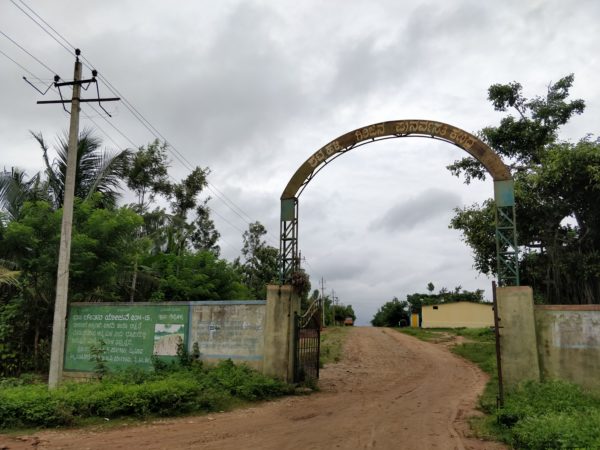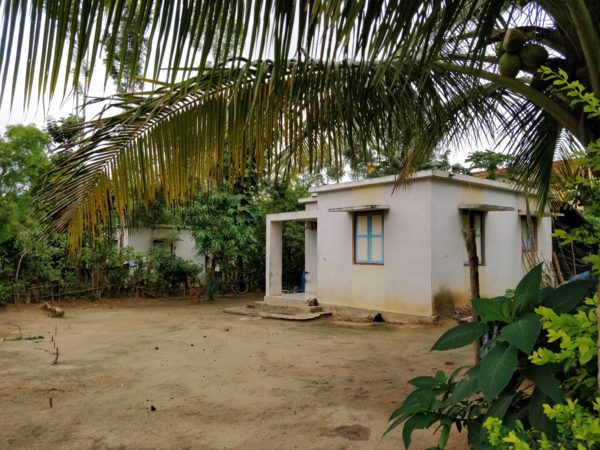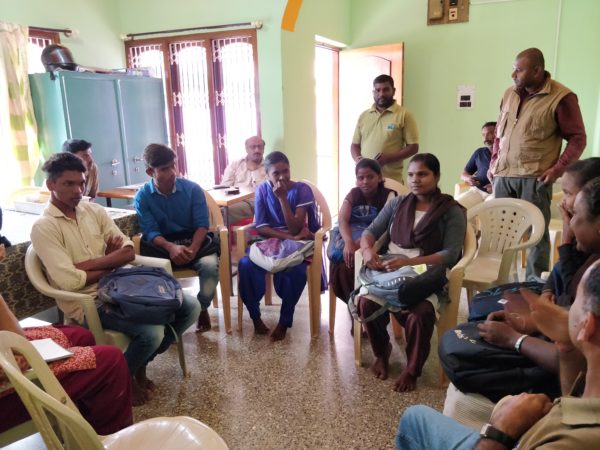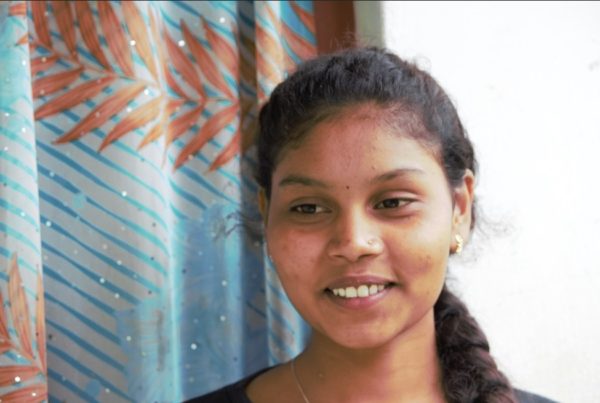As Nagarahole tiger reserve tribals join the mainstream, the boundaries are blurring.
Small vans crammed with household stuff come bouncing along the road and into the Masthigudi relocation centre in H D Kote. The luggage also includes useful bits and pieces of the dismantled huts once lived in.
This is the site of the latest tribal colony built in Bheemanahalli village by the government to accommodate around 200 families that have sought voluntary relocation from various parts of the Nagarahole tiger reserve. Around 60 families have moved in so far in the last two weeks of June this year.
Youngsters can be seen speeding down the streets on their bikes, much like in any city. Those lazing around are fiddling on mobile phones, watching movies or checking WhatsApp and Facebook.

Shettalli settlement entrance © Meghana Sanka
Broad streets have small houses built on either side, on plots measuring 50x80. The concrete units have a hall, bedroom, kitchen, and bath. A few vessels and bundles of clothes sum up the belongings in Prakash’s new home. Not to forget the new flat screen television set put up on the wall, still wrapped in plastic.
From the Rs 10 lakh per beneficiary paid by the centre, a part of it is used to build the houses and some amount retained for common amenities like community hall, anganwadi, etc. The families are given Rs 75,000 for expenses during the shifting. After paying for transport from the forest, the remaining money is used up to buy necessities. Each family is also given three acres of land to cultivate.
Prakash and his brother have cooked up a meal for the family, which includes three small children. The women have gone out to chat up with others. The children, aged between 2-5 are eating from melmoware cutlery and even the youngest helps herself using a spoon.
That takes Lokesh K S, Associate Conservationist, WCS India Program, a few years down memory lane.

House inside Shettalli settlement © Meghana Sanka
It was the year 1997 and he had brought along a delegation of the tribal community from Nagarahole to Bangalore to meet the forest minister Gurupadappa Nagamarapalli and request for a relocation package. The group of 51 families with their leaders was put up in a few rooms of the Hotel Airlines on St Marks Road. “I had specifically told them to be ready early and in time for going to the meet. But morning when I went to check on them, I was surprised to see all of them unprepared. They had been awake all night watching television in one of the rooms that had the set.”
It took Lokesh some coaxing to wean them away from the idiot box and ready for breakfast. And that provided some entertainment as well, he notes. Given cutlery replete with spoons and forks, the group took it upon themselves to eat using the foreign items and the result was a vada or two that went flying. “I am not joking, but all of them trying to use spoons and forks made such a jingling noise that passersby thought some morning orchestra was playing!” says Lokesh.
The little girl at Masthigudi has no such trouble eating her rice with a spoon. And television is no more a luxury as much as a necessity.
Thanks to the efforts from Lokesh and team, the Karnataka government announced a relocation package with financial support from Project Tiger in 1997. Since then, 620 families have been relocated from Nagarahole tiger reserve.
While many of the youth in the families discontinue studies and opt to join their parents going as labour to work in coffee plantations, there is a small group that is seeking change. Like the jenukuruba Geetha studying for BA in a college at Hunsur. She plans to take up law and “help bring justice to my community” while Rashmi, doing her B Com degree, wants to take up CA. Swamy, who is a sports enthusiast, has taken part in the National Games at Kolkatta. Ashok has done his diploma in engineering. Most belong to the jenukuruba community and are experts at harvesting honey from the forests. Yerawas and betta kurubas form the remaining.

Tribal youth with aspirations speaking about their future plans © Meghana Sanka
Since 2000, WCS India Program has sponsored higher education for over 500 tribal students in the area. From fees to uniform and books all are paid for by the organization. Sunil from Nagapura completed his degree and is now employed with the Kembukolli panchayat. Chandra from Naanachi joined India Post after his degree.
Support from the organization also goes beyond the monetary with staff actively helping the student aspirants in their pursuits. For instance, in the case of Yerawa Nisha from Hebbala settlement, it was a near-miracle that was achieved in procuring the caste certificate for admission to college.

Nisha from Hebbala settlement © Meghana Sanka
The certificate was outdated and this was discovered only when filling in the admission form. The college gave a single day to get it ready. Lokesh went along with Nisha to the Hunsur taluk office and used his persuasive powers to get the person concerned to move the file and stamp the certificate. All in a single day!
Today, Nisha has completed her diploma in Computer Science and plans to take up higher studies. This composed teenager is all confidence, despite the fact that she had to make a difficult transition from Kannada medium school to English medium education. Comparatively, the transition from forest to town for most tribals has been almost seamless, forks and spoons included.
Written by Jayalakshmi K